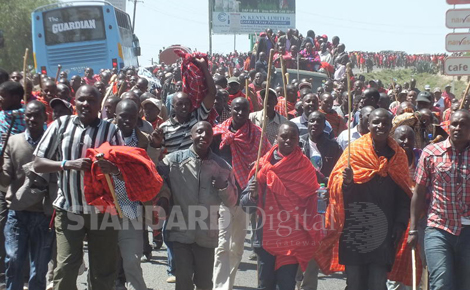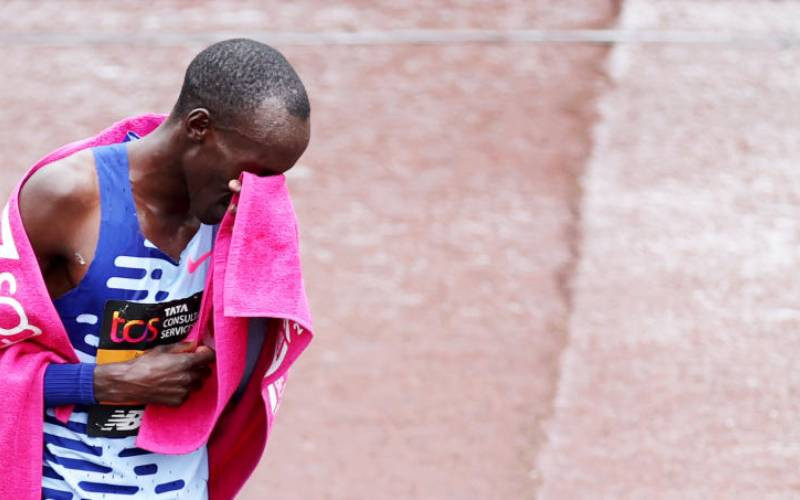 |
|
Demonstrators march towards the county headquarters on Monday where they had planned to present a petition to Governor Samuel Tunai against alleged misappropriation of county resources. [Photo: CHARLES NGENO/STANDARD] |
NAIROBI: The political rivalry in Narok County that led to deaths and injuries following violent protests took another twist Wednesday afternoon with arrests and a night in the cells for five Members of Parliament who took part, one of them a senator. In what could be the biggest number of serving politicians to be thrown into the cells in one day certainly a different experience for Kenyans, the leaders were locked up at Muthaiga Police Station, Nairobi.
Those detained by the Criminal Investigations Department are Narok Senator Stephen ole Ntutu (senator) and four local parliamentarians: Moitalel Kenta (Narok North), Korei Lemein (Narok South), Patrick Ntutu (Narok West) and Johanna Ng’eno (Emmurua Dikkirr).
They had initially been ordered to appear at CID headquarters to answer various questions regarding the chaos which reigned on Monday and left two people dead and six injured.
READ: Narok leaders summoned over Monday protests where two people were killed
Among those injured was the county’s police commander Paul Leting and a General Service Unit’s officer.
The arrests followed a warning by the new Interior Cabinet Secretary Joseph ole Nkaissery that those behind the violence, targeting law enforcement officers, would face the wrath of the law.
Wednesday, after being questioned for more than six hours, the politicians were shocked with the news that they would not be travelling back home, where they had been waging a protracted war against their governor, Samuel ole Tunai, or even their houses in Nairobi for that matter. Instead they were to be guests of the State at a nearby police station.
The lawyers, who had accompanied them to the CID headquarters, could be seen making frantic efforts trying to secure their release on bail, but in vain as the dejected leaders were escorted to police cells and locked up for the night.
They were summoned after the Director of Public Prosecution Keriako Tobiko directed the police to start investigations following the violence which followed the demonstrations planned to accompany presentation of a petition to the Narok governor.
The legislators arrived at the CID headquarters at around midday and spent the better part of the day with the officers. They appeared before Director of Criminal Investigations Ndegwa Muhoro who later referred them to the investigating team led by Joseph Ngisa.
“We will know if they will be charged later. Investigations are still going on,” said Muhoro.
Several supporters of the legislators later flocked the CID headquarters waiting for them to be freed. They camped outside as the leaders recorded their statements on what transpired in Narok on the material day.
The leaders, who had been exuding confidence hours earlier, looked tired and shaken when they were driven from CID headquarters to Muthaiga in police cars as the crowd watched.
Trouble started when a group of protesters stormed the county headquarters and attempted to present the petition, detailing their grievances, to Tunai.
Police officers backed by a helicopter aerial surveillance from the Kenya Forest Service were detailed to restrain protestors from accessing the county government offices.
Stay informed. Subscribe to our newsletter
The politicians have been engaged in running battles with Tunai, accusing him of protecting “non-Maasai interests” in Narok.
DISMISS FEARS
He is accused of employing outsiders at the county government and failing to address an alleged 4,000-acre irregular land allocation at the Masai Mara Game Reserve. Tunai denies the accusations.
Before the tensions, which had been building up in Narok imploded in Monday violence, President Uhuru Kenyatta had tried to reconcile the warring sides and advised them to seek dialogue.
However, the Narok leaders insisted they were holding peaceful demonstrations to present a petition to the governor and dismissed fears there would be violence.
Tunai had rejected the allegations that he misappropriated funds collected from Maasai Mara and hit at his critics for allegedly mudslinging him as part of an ouster plan.
According to Tunai, “most of my critics have served in powerful positions in the past regimes and did nothing to improve the lives of the people of Narok”. He went on: “That is why they are getting jittery over my development record for the short time I have served as governor.”
Nkaissery had at the weekend warned against any form of protests in the county, advising that leadership issues should be resolved through dialogue.
He later ordered that the leaders behind the protests be questioned after they defied the directive.
Nkaissery had appealed to the area leaders to use dialogue instead of engaging in tactics that could escalate to violence. “The Government also wishes to point out that when allegations of corruption in Narok County emerged, officers from the office of the Auditor General as well as the office of Ethics and Anti-Corruption Commission were swiftly dispatched to the county to investigate,” he said.
 The Standard Group Plc is a
multi-media organization with investments in media platforms spanning newspaper
print operations, television, radio broadcasting, digital and online services. The
Standard Group is recognized as a leading multi-media house in Kenya with a key
influence in matters of national and international interest.
The Standard Group Plc is a
multi-media organization with investments in media platforms spanning newspaper
print operations, television, radio broadcasting, digital and online services. The
Standard Group is recognized as a leading multi-media house in Kenya with a key
influence in matters of national and international interest.
 The Standard Group Plc is a
multi-media organization with investments in media platforms spanning newspaper
print operations, television, radio broadcasting, digital and online services. The
Standard Group is recognized as a leading multi-media house in Kenya with a key
influence in matters of national and international interest.
The Standard Group Plc is a
multi-media organization with investments in media platforms spanning newspaper
print operations, television, radio broadcasting, digital and online services. The
Standard Group is recognized as a leading multi-media house in Kenya with a key
influence in matters of national and international interest.






